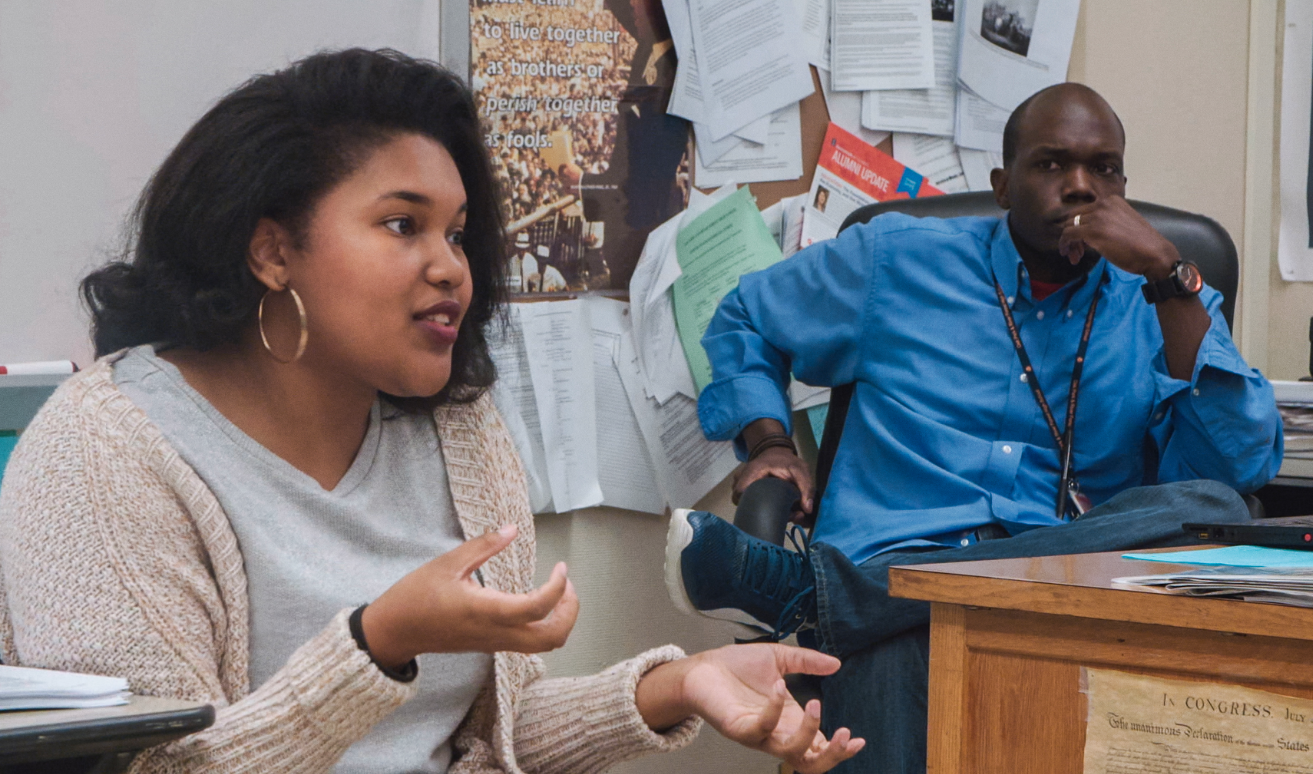It makes sense that so much of America to Me follows Oak Park and River Forest’s slam poetry team. It is, after all, one arena in the school where students — particularly black students — have almost complete freedom to express themselves.
It’s also remarkable that so many of the students' poems are about representation. They go deep on how black students are presented on screen while being presented on screen in a documentary about their high school. There are more layers here than in a croissant. Most black students at OPRF are keenly aware of how black people their age are portrayed. And they are NOT HAPPY about it.
It’s a new semester at OPRF and Jada has a fresh creative pursuit. She’s been working on a web series about issues facing her high school. The first episode concerns white students using the n-word. The final credits simply read “Dear OPRF, you’re welcome.” (Oh, Jada — dear, sweet Jada — thank you for this unparalleled moment of necessary pettiness.)
Even when I was at OPRF, in the mid-aughts, white students using the n-word wasn’t uncommon. My sophomore year, at the beginning of the “live journal” boom, somebody at the school ran a Gossip Girl-style blog where they’d anonymously dish on all the hot drama at the school. After awhile, the blog just became a catalog of every time a white upperclassmen said the n-word. As I wrote after Episode 2, my American English teacher left it up to us whether we wanted to use the n-word while reading Huckleberry Finn. Some white students leaned into it. Some found ways to use the word even in the parts of the book without Jim.
Jada wants her peers to take very specific messages from her work. She’s young and she’s making films about things she feels strongly about. So when her classmates push back on the idea that white people shouldn’t use the n-word with their own skewed opinions on race, she lectures them. She hasn’t yet discovered the fun of leading an audience to a point rather than handing it to them on a platter.
Oh, and about those skewed opinions on race. One African student takes away from Jada’s web series that “police don’t bother me because I’m African and not African-American.”
He continues: “Black people should dress in suits and they won’t be bothered by police.”
THERE ISN’T ENOUGH TIME IN THE WORLD TO EXPLAIN EVERYTHING RIDICULOUS IN THOSE TWO SENTENCES.
Later, a white student says something about “brotherhood” and “the culture.” Someone please guide these children.
Yet another reaction to the web series comes from Diane Barrios-Smith, a Mexican-American student with two lesbian parents. She continues to try and connect the n-word to other racial slurs, saying that blacks are oppressing themselves by using it and that there are other types of oppression that need to be considered.
Jada isn’t interested in having those other conversations — and maybe she shouldn’t have to be when the one she’s trying to have is fraught enough.
Elsewhere, there’s still so much happening. Kendale, a wrestler, is finally staking his claim in his weight class. His next meet doubles as a teacher appreciation night (each wrestler invites an instructor), and Kendale picks Mr. Noble. He also sits down with Mr. Noble to discuss Te-Nehisi Coates’s Between the World and Me. It’s a great example of a teacher starting a dialogue with a student from a different culture. Rather than centering his own experiences and demanding that his students respond to his identity, Mr. Noble, in recommending the book, creates an opportunity for Kendale to express his own identity and experience. He listens and responds sincerely even if what his student has to say is uncomfortable.
In world studies, Grant’s teacher is also opening up the conversation about race. (I don’t remember this many guided discussions about race when I attended OPRF. When I was in school, we all pretended race was invisible and also pretended to like all the Star Wars prequels!) Grant says that he’s never been affected negatively because of his race, but then tells a story about his dad being stopped in a white suburb while visiting Grant’s white grandmother. According to his dad, five or six cars’ worth of cops surround him, guns out, because a neighbor reported seeing a black man running down the street “with guns blazing.” One cop almost lets the n-word slip. Grant remembers the event being extremely scary, and his father recalls thinking his children might be raised without their father if he moved the wrong way.
Brendan’s family also recounts their painful experience with race. In middle school, when Brendan was the only white kid on his basketball team, he started to realize that his teammates were only interested in their own success and would blame him and others when things didn’t go their way. Slowly, he began ascribing those negative qualities to every member of the group. So they helped him through some difficult conversations in hopes that he didn’t end up with different values than them.
If they succeeded, I need them to share those conversations with every other white parent at OPRF — and in the world.




